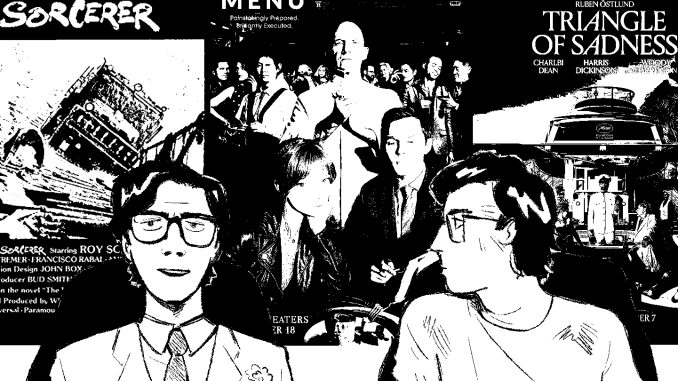
By Shea Stevenson
In the wake of 2019’s “Parasite” being fantastic and making ridiculous money, there’s been a fresh wave of American movies looking to capitalize on the popular anti-capitalist vibe. Just last year we had “Glass Onion,” “The Menu,” “Triangle of Sadness,” and more. Of course, people have been telling stories about the horrors of wealth inequality for centuries; all of its most iconic imagery (eating the rich, the guillotine, etc.) came long before cameras existed. So what’s different about these new movies?
Enough ink to fill the Hudson has already been spilled on the subject of how modern capitalism subsumes and commodifies anti-capitalism. Rather than making problems for the rich, you go see the movie that says “the rich are causing problems” to declare where you stand on the topic. The movie’s goal is to get angst out of your system. They provide catharsis in recognition of a problem, and often a release in some form by ritualistically defeating their rich in fiction. These American movies attempt to speak on an existential threat to a catastrophic majority of human beings, but operate so foundationally within the rules of that threat that they can’t imagine other ways of being.
Though movies like “The Menu”and “Glass Onion” pay lip service to more broadly radical ideas, their issue with the rich characters boils down to “they are mean.” In every “Parasite-like” that I’ve seen, it is about the rich. Poor characters are central, but the rich are always on screen as personal, active agents in the story.
These movies are playing the same game as their target, but the target made the rules. Consider for a moment that there are other games.
“The Salary Of Fear” (1950) is a French novel about four European workers in South America who are coerced by a US oil company into driving nitroglycerin (stuff that makes TNT explode) over mountains. If they hit a bump too hard, they explode. In typical French fashion, it’s all for worker’s rights, granted that white people are the ones being exploited. It contrives a plot in which brutal South American working conditions are inflicted upon white Europeans rather than South Americans.
In 1977, William Friedkin, director of “The Exorcist,” adapted the book “Sorcerer” into a movie. This was the third adaptation of the book since 1953 and aside from obviously improving the title to, for some inscrutable reason, a wizard name, “Sorcerer” is the first in a subgenre that never came to fruition: the blue-collar horror movie.
It is easy to imagine a world where a movie like “Sorcerer” begets offspring like “Parasite” did. The movie is intense, honest, and frightening. It’s historical fiction shot like horror. Wisely, it diversifies the cast (American, Frenchmen, Mexican and Palestinian) and most importantly, through its source material, it doesn’t ideologically play the American game.
In 1977, neoliberalism was not assumed policy in America. Though the American empire was certainly on its way, the Vietnam War had just ended, and there was a coin flip between sinking further into laissez faire capitalism and broader social safety nets. The middle class was as present as it would ever be, and the government had yet to fully endorse a hands-off approach to welfare. With later presidents like Bill Clinton, the field changed; it was no longer the experiment of neoliberal economics versus robust welfare and worker’s rights, the right and left (political parties) were in agreement on neoliberalism by then. It was only a matter of severity.
That’s the world in which these pop movies come from. They accept that this is how it’ll be going forward, but maybe we could do it less hard? It’s important, then, to look back at art made outside of our sphere of time and thought. “Sorcerer” has no rich people in it. It is horrified not by a specific disparity of wealth; it doesn’t matter how rich the rich are; if this is how the disenfranchised live, that is terrible enough. It’s scared of alienated labor, irrefusable commands, lack of oversight, the way this system extinguishes the lives of everyone who can’t pay into its good graces. Other movies criticize those who benefit from absconded labor, yet don’t look at it directly themselves. “Sorcerer” has not yet accepted that this is normal.
“Sorcerer” didn’t have imitators because it hemorrhaged money. It’s likely because it was released right around the first “Star Wars” movie, perhaps the biggest pop anti-imperialism movie with nothing of value to add to the conversation aside from space wizards (admittedly sick). Give me more films like “Sorcerer.” I think we have enough of “The Menu” to go around.
